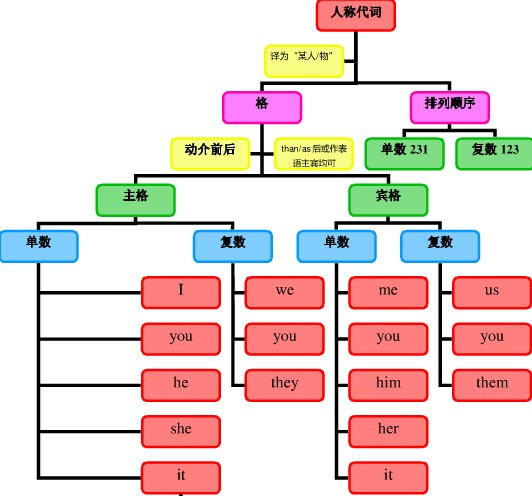本试题 “— Where did you pick up this wallet?— _____ in the supermarket.A. That wasB. That isC. It wasD. It is” 主要考查您对人称代词
一般过去时
等考点的理解。关于这些考点您可以点击下面的选项卡查看详细档案。
- 人称代词
- 一般过去时
人称代词的概念:
人称代词是替代我、你、他、她、它、我们、你们、他们、她们、它们等人称的词。
人称代词分为主格和宾格形式,并有人称的单复数形式。按所替代人称的不同分为第一人称、第二人称和第三人称。
人称代词的用法:
人称代词在句中可以用作主语(用主格,如:I,you,he,she,we,they,等)和宾语(用宾格,如 me,you,him,her,us,them等)
如:He loves her, but she hates him. 他爱她,但她却讨厌他。
注:(1)在口语中,当人称代词用作表语、用于than, as之后或用于强调句中被强调时,可以用语。 例如:
"Who is it?" "It's me."“是谁呀?”“是我。”
He sings better than me. 他比我唱得好。
He is as tall as her. 他和她一样高。
It's me who did it. 这是我干的。但是,若than,as后的人称代词后跟有动词,则必须用主格。例如:
He sings better than I do./ He is as tall as she is.
(2)单独使用的人称代词通常用宾格。
"I' m tired.""Me too."“我累了。”“我也累了。”
"Who wants this?" "Me."“谁要这个?”“我要。”
(3)有时用主格或宾格会导致意思的变化。
I like you better than he. 我比他更喜欢你。为 I like you better than he likes you. 之略。
I like you better than him. 我喜欢你胜过喜欢他。为 I like you better than he likes him. 之略。
人称代词主格、宾格、人称、单复数对比:
|
人称代词 |
单数 |
复数 | ||
|
主格 |
宾格 |
主格 |
宾格 | |
|
第一人称 |
I |
me |
we |
us |
|
第二人称 |
you |
you |
you |
you |
|
第三人称 |
he |
him |
they |
them |
|
she |
her |
them | ||
|
it |
it | |||
人称代词的排序:
人称代词的排列顺序为:单数人称代词通常按“二三一”排列,即you, he and I;复数人称代词通常按“一二三”排列,即we, you and they:
You, he and I are of the same age. 你,他和我都是同一年龄。
We, you and they are all good citizens. 我们,你们和他们都是好公民。
但若是用于承担责任或错误等场合,则可把第一人称I置于其他人称代词之前:
I and Tom are to blame. 我和汤姆该受批评。
比较:Tom and I hope to go there. 汤姆和我想去那儿。
注意:you and I 是固定结构,语序通常不宜颠倒。
人称代词知识体系:

人称代词用法拓展:
1、在通常情况下,人称代词在句子中出现在它所代替的名词之后,即先出现名词,再出现相应的代词。但是,在书面语中,有时也可出现代词,后出现代词所代替的名词。
As soon as it had hopped off, the plane picked up speed.飞机刚一起飞,就加了速。
(比较:As soon as the plane had hopped off, it picked up speed.)
2、人称代词后跟名词同位语。有些人称代词后有时可跟同位语。
These small desks are forus students.这些小课桌是给我们学生的。
We girls often go to the movies together.我们女孩子常一起去看电影。
He asked you boys to be quiet.他要你们男孩子安静些。
一般过去时的概念:
一般过去时表示过去某个时间里发生的动作或状态;过去习惯性、经常性的动作、行为;过去主语所具备的能力和性格。
一般过去时的用法:
1、表示过去发生的动作或存在的状态,常与表示过去时间的副词如:yesterday,last week,two hours ago等连用。
如:My family moved here five years ago. 我家五年前搬到了这里。
I was born in 1973. 我生于1973年。
2、表示过去一段时间经常或反复发生的动作。这时可与频度副词如:often,usually,always等连用。
如:He always worked in tonight those days. 那些日子他总是工作到深夜。
I often left on business in 1987. 1987年我经常出差。
注:表示“过去经常,而今不再”时,要用usedto.
如:I used to read newspaper after breakfast. 我过去经常早饭后看报纸。(意指现在已不是这样)
The children often swam in this river. 孩子们过去经常在这条河里游泳。
3、表示过去发生的一连串动作。
如:He put down the heavy box, took out the keys, and opened the door. 他放下这沉重的箱子,掏出钥匙开了房门。
注:过去发生的一连串动作,若用and,or,but等并列连词连接,则一律用过去式。
如:They moved the chairs to the table, sat down and began to have supper. 他们把椅子搬到桌边,坐下开始吃饭。
4、在时间和条件状语从句中,用一般过去时表示过去将来的动作。
如:He said that he would let me know as soon as he got the information. 他说他一得到消息就立即让我知道。
Mary told me that she would stay at home if it rained. 玛丽告诉我如果下雨她就呆在家里。
一般过去时的特别用法:
1、句型:It is time for sb. to do sth "到……时间了" "该……了"。
例如:It is time for you to go to bed.你该睡觉了。
It is time that sb.did sth. "时间已迟了" "早该……了"。
例如:It is time you went to bed. 你早该睡觉了。
2、would(had)rather sb.did sth. 表示'宁愿某人做某事'。
例如:I'd rather you came tomorrow. 还是明天来吧。
3、wish, wonder, think, hope等用过去时,作试探性的询问、请求、建议等,而一般过去时表示的动作或状态都已成为过去,现已不复存在。
例如:I thought you might have some. 我以为你想要一些。
比较:Christine was an invalid all her life.(含义:她已不在人间。)
Christine has been an invalid all her life.(含义:她现在还活着)
Mrs. Darby lived in Kentucky for seven years.(含义:达比太太已不再住在肯塔基州。)
Mrs. Darby has lived in Kentucky for seven years.(含义:现在还住在肯塔基州,有可能指刚离去)
注意:用过去时表示现在,表示委婉语气。
1)动词want, hope, wonder, think, intend等。
例如:Did you want any thing else? 您还要些什么吗?
I wondered if you could help me. 能不能帮我一下。
2)情态动词could, would。
例如:Could you lend me your bike? 你的自行车,能借用一些吗?
与“— Where did you pick up this wallet?— _____ in the superm...”考查相似的试题有:
- ---Have you heard of this new computer brand, Mike?---Yes, of course and I’ve decided to buy _____.A.itB.oneC.this...
- One of the most important questions they had to consider was _________ of public health.A.whatB.thisC.whichD.that
- It is not so difficult to learn English well. ________ you need is listening, speaking, reading and writing it every ...
- —Is Jissica a diligent student ?—No , but she is a lazy one , if .A.somethingB.everythingC.anythingD.nothing
- 假定英语课上老师要求同桌之间交换修改作文,请你修改你同桌写的以下作文。文中共有10处语言错误,每句中最多有两处。错误涉...
- As I______ the little grass house in the forest, my heart beat more and more quickly.A.approachedB.walkedC.ranD.s...
- — The final exam is coming.Would you mind my staying up late, going over my lessons?— I'd rather you________.With the...
- The businessman __________ a lot of money to the hospital, which was helpful to the development of it.[ ]A. donatedB....
- ---Have you ________?---No. I had the wrong number.A.got inB.got awayC.got offD.got through
- To our disappointment, the trip we had been looking forward to ________ in the pouring rain.[ ]A.startingB.startC....